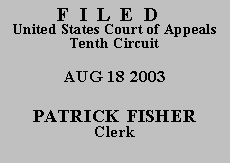

| UNITED STATES OF AMERICA,
v.
LYDELL PHILLIP |
No. 03-2048
(D.C. No. CR-01-1263-BB) |
Following a jury trial, Lydell Phillip was convicted of one count of aggravated sexual abuse in Indian Country, in violation of 18 U.S.C. §§ 2241 and 1153.(1) On direct appeal, Phillip challenges the sufficiency of the evidence to support his conviction. We exercise jurisdiction pursuant to 28 U.S.C. § 1291 and affirm.
In evaluating sufficiency-of-the-evidence claims, "[w]e must determine whether viewing the evidence in the light most favorable to the government, any rational trier of fact could have found the defendant guilty of the crime beyond a reasonable doubt." United States v. Vallo, 238 F.3d 1242, 1247 (10th Cir. 2001) (quotation omitted). In our review, we "must not weigh conflicting evidence or consider the credibility of the witnesses, but simply determine whether the evidence, if believed, would establish each element of the crime." Id. (quotation omitted). In order to prove a violation of 18 U.S.C. § 2241(a), the government must establish that (1) the defendant knowingly caused the victim to engage in a sexual act (2) by using force or by threatening or placing the victim in fear of death or serious bodily injury or kidnapping.
Testimony at trial showed that the following events leading up to Phillip's conviction took place. In the early morning hours of August 21, 2001, Lena Willie was awakened to find Phillip, the father of her grandchild, standing over her bed. Phillip pulled a knife out of his pocket and pressed it against Willie's cheek. Phillip then began to touch Willie and placed the knife to her throat. When Willie was not receptive to Phillip's sexual advance, Phillip slapped her across her face. Phillip then ripped off Willie's nightgown and engaged in forced intercourse with her. After Phillip left, Willie went next door to her daughter's home and told her what had just occurred. Willie's daughter immediately reported the incident to the police and took Willie to the hospital. At the hospital, Dr. Bond examined Willie, noticing redness in her cheeks and recent scratches on her neck, her buttocks, and upper thigh. He also observed tears and abrasions to Willie's vaginal area, which he testified were consistent with the events as described by Willie. A DNA analysis revealed Phillip as the source of sperm found during the examination.
On August 23, 2001, Special Agent Tony Henrie of the FBI and Navajo Nation Criminal Investigator Leroy Deal met with Phillip at the Shiprock, New Mexico Police Department. Phillip was advised of, and waived, his Miranda rights. He told the investigators five different accounts of what happened on the night in question, but at trial, Phillip told another story. He testified that Willie raped him, and that Willie pulled out a knife and attempted to stab him in order to prevent him from testifying against her son in an unrelated criminal matter.
In convicting Phillip, the jury rejected Phillip's version of events, despite inconsistencies in Willie's testimony and the lack of definitive physical evidence showing how Phillip entered the house. In our review, we do not "weigh conflicting evidence or consider the credibility of the witnesses." Vallo, 238 F.3d at 1247 (quotation omitted). Moreover, the government was not required to show how Phillip entered Willie's house in order to prove its case. Based on Willie's account of the events, the medical evidence, and the testimony of the officers, a reasonable jury could conclude that Phillip was guilty beyond a reasonable doubt of aggravated sexual assault. That Phillip testified and told a different story, which the jury did not believe, does not undermine the validity of his conviction. Accordingly, we AFFIRM.
ENTERED FOR THE COURT
Carlos F. Lucero
Circuit Judge
*. At the parties' request, the case is unanimously ordered submitted without oral argument pursuant to Fed. R. App. P. 34(f) and 10th Cir. R. 34.1(G). This order and judgment is not binding precedent, except under the doctrines of law of the case, res judicata, and collateral estoppel. The court generally disfavors the citation of orders and judgments; nevertheless, an order and judgment may be cited under the terms and conditions of 10th Cir. R. 36.3.
1. The parties stipulated that the defendant is an Indian and that the incident took place in Indian Country, jurisdictional requirements of 18 U.S.C. § 1153.